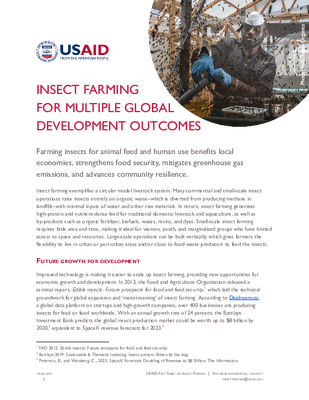Insect Farming For Multiple Global Development Outcomes

Farming insects for animal feed and human use benefits local economies, strengthens food security, mitigates greenhouse gas emissions, and advances community resilience.
Insect farming exemplifies a circular model livestock system. Many commercial and small-scale insect operations raise insects entirely on organic waste–which is diverted from producing methane in landfills–with minimal inputs of water and other raw materials. In return, insect farming generates high-protein and nutrient-dense feed for traditional domestic livestock and aquaculture, as well as by-products such as organic fertilizer, biofuels, waxes, resins, and dyes. Small-scale insect farming requires little area and time, making it ideal for women, youth, and marginalized groups who have limited access to space and resources. Large-scale operations can be built vertically, which gives farmers the flexibility to live in urban or peri-urban areas and/or close to food waste producers to feed the insects.



